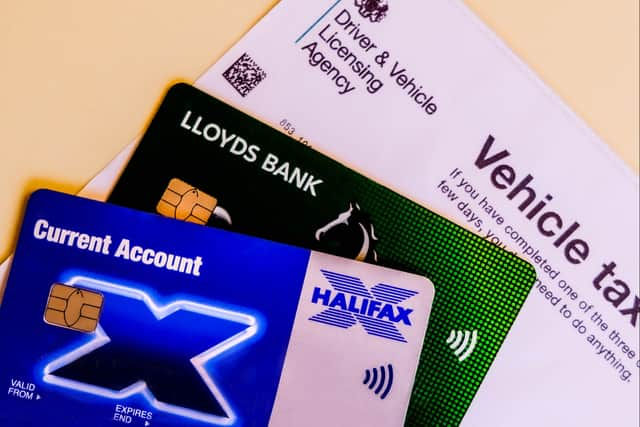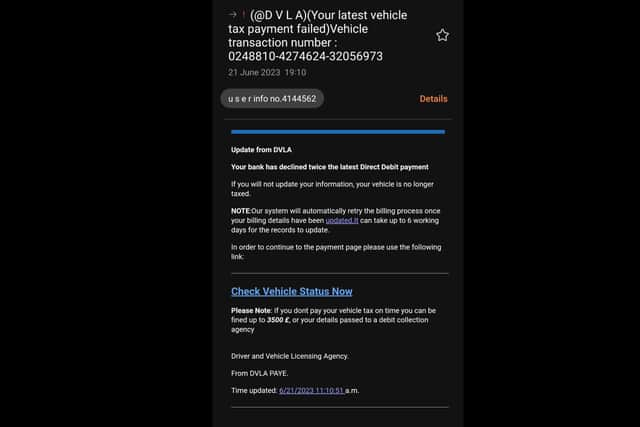DVLA scam warning to drivers over email that could steal your bank details
and live on Freeview channel 276
A scam email claiming to be from the Driver and Vehicle Licensing Agency (DVLA) is circulating to try and dupe recipients into handing over their bank details.
The email states that the recipient’s latest vehicle tax payment has failed due to their bank declining the direct debit, meaning their vehicle is no longer taxed.
Recipients are then urged to update their billing details and resubmit the tax payment, warning that failure to do so within six working days could incur a fine up to £3,500. Scammers then attempt to lure people to click on a fraudulent link where they are asked to enter their bank details to make a payment.


The email appears to look like a genuine government webpage and includes a vehicle transaction number in a bid to appear authentic, although a closer look at the sender address makes clear it is not a legitimate government email.
The message reads: “(@D V L A)(Your latest vehicle tax payment failed)Vehicle transaction number : 0248810-4274624-32056973. Update from DVLA. Your bank has declined twice the latest Direct Debit payment. If you will not update your information, your vehicle is no longer taxed.
“NOTE:Our system will automatically retry the billing process once your billing details have been updated.It can take up to 6 working days for the records to update. In order to continue to the payment page please use the following link: Check Vehicle Status Now.
“Please Note: If you dont pay your vehicle tax on time you can be fined up to 3500 £, or your details passed to a debit collection agency. Driver and Vehicle Licensing Agency. From DVLA PAYE. Time updated: 6/21/2023 11:10:51 a.m.”


The National Cyber Security Centre (NCSC) has previously warned that the DVLA is one of the top government organisations being targeted by criminals. To help reduce the number of people falling victim to such scams, the NCSC has issued advice to help spot fraudulent emails, texts and calls.
It recommends paying close attention to the language used within the message as scams often include one or more of the following tell-tale signs to pressure you into acting without thinking:
- Authority - does the message claim to be from someone official, such as your bank, doctor, a solicitor, or a government department
- Urgency - does the message give you a limited time to respond, such as ‘24 hours’ or ‘immediately’, and threaten you with fines or other negative consequences
- Emotion - does the message make you panic, fearful, hopeful or curious? Criminals often use threatening language or make false claims of support
- Scarcity - does the message offer something in short supply, such as concert tickets, money or a cure for medical conditions to dupe you into responding quickly
- Current events - are you expecting to see a message like this? Criminals often exploit current news stories, big events or specific times of year (like tax reporting) to make their scam seem more relevant to you
The NCSC adds: “If you have any doubts about a message, contact the organisation directly. Don’t use the numbers or address in the message – use the details from their official website. Remember, your bank (or any other official source) will never ask you to supply personal information via email, or call and ask you to confirm your bank account details.
“If you suspect someone is not who they claim to be, hang up and contact the organisation directly. If you have paper statements or a credit card from the organisation, official contact details are often written on them.”
The government also recommends searching on Gov.uk to find official government services and phone numbers, such as if you want to apply to the DVLA for a driving licence. If you have received a suspicious email you should forward it to [email protected].
Comment Guidelines
National World encourages reader discussion on our stories. User feedback, insights and back-and-forth exchanges add a rich layer of context to reporting. Please review our Community Guidelines before commenting.
